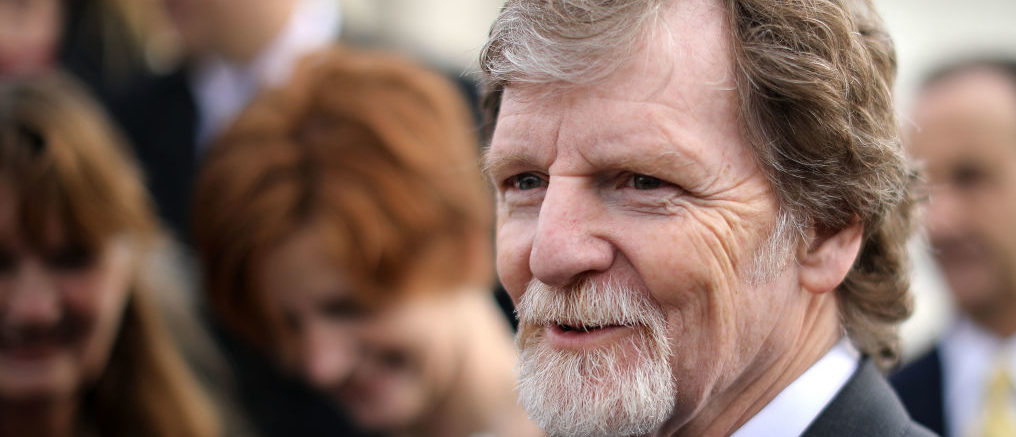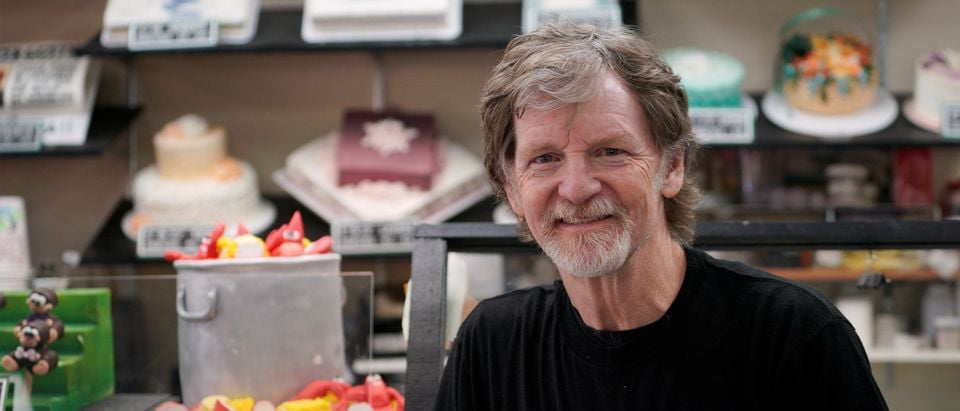- The Supreme Court’s recent decision in 303 Creative v. Elenis, a landmark First Amendment case, may finally bring Masterpiece Cakeshop owner Jack Phillip’s more than a decade-long legal battle to a decisive end.
- “I served everybody,” Phillips told the DCNF. “Justice Gorsuch put it best —he said it’s the what, not the who. There are many cakes that I decline to make because of the message they express.”
- The Alliance Defending Freedom represents other creative professionals challenging their states’ public accommodations laws, including photographers Emilee Carpenter in New York and Chelsey Nelson in Kentucky, who will also be impacted by the 303 Creative ruling.
The Supreme Court’s recent decision in a landmark First Amendment case may finally bring Masterpiece Cakeshop owner Jack Phillip’s more than a decade-long legal battle to a decisive end.
Though Phillips won his 2018 Supreme Court case after declining to create a custom wedding cake for a same-sex couple, his victory didn’t stop Colorado courts from later siding with a transgender attorney, Autumn Scardina, who filed a lawsuit against him for declining to make a cake symbolizing “gender transition.” That’s because the ruling in Phillips’ case only addressed the state’s hostility against his religious beliefs, not the broader free speech issues surrounding Colorado’s law barring public accommodations from restricting services based on sexual orientation, which have now been resolved by the Supreme Court’s decision in 303 Creative v. Elenis.
Phillips’ lawyer, ADF senior counsel Matt Sharp, told the DCNF they are “hopeful” the Supreme Court’s robust articulation of business owners’ free speech rights in 303 Creative “will help resolve Jack’s case and give him the justice he’s been working for for all these years.”
“When these laws, like the Colorado Anti-Discrimination Act, collide with the First Amendment, [they] have to give way to the constitutional rights of Jack and Lorie and others,” Sharp said.
Phillips told the DCNF the ruling was good for not only him, but for every American’s ability to “live and speak freely according to their conscience,” reiterating his decisions are made based on the message. He won’t, for example, “make cakes that have profanity in them, or cakes that are un-American, or cakes that denigrate other people.”
“I served everybody,” Phillips told the DCNF. “Justice Gorsuch put it best —he said it’s the what, not the who. There are many cakes that I decline to make because of the message they express.” (RELATED: ‘The Lord Was Working’: Christian Web Designer At The Center Of Landmark Supreme Court Decision Speaks Out)

WASHINGTON, DC – DECEMBER 05: Conservative Christian baker Jack Phillips talks with journalists in front of the Supreme Court after the court heard the case Masterpiece Cakeshop v. Colorado Civil Rights Commission December 5, 2017 in Washington, DC. Siting his religious beliefs, Phillips refused to sell a gay couple a wedding cake for their same-sex ceremony in 2012, beginning a legal battle over freedom of speech and religion. (Photo by Chip Somodevilla/Getty Images)
Phillips is not the only one who stands to benefit from the ruling. In 2013, Aaron and Melissa Klein, owners of Sweet Cakes by Melissa, were also asked to create a custom wedding cake for a same-sex wedding.
As with Phillips, the 2018 Masterpiece Cakeshop decision did not fully resolve the Klein’s case: they’re still facing a $30,000 penalty from the Oregon Bureau of Labor and Industries. On the same day 303 Creative was decided, the Supreme Court vacated a decision against them and remanded their case back to the Oregon Court of Appeals.
Stephanie Taub, First Liberty Institute senior counsel, told the DCNF the Supreme Court’s decision “should finally resolve the case” and give them the “justice” they’ve sought for the past ten years.
“They had to close their doors,” Taub said. “They have since moved out of state. The good news is they opened a new bakery in a different state and are doing well.”
Twenty-two states and Washington, D.C. have public accommodation laws similar to the Colorado Anti-Discrimination Act, according to ADF.
ADF represents other creative professionals challenging their states’ public accommodations laws on the same basis, including photographers Emilee Carpenter in New York and Chelsey Nelson in Kentucky. For Carpenter, violating New York’s public accommodations law by declining to photograph a same-sex wedding could cost up to $100,000 in fines, the loss of her business license and up to a year-long jail sentence.
Sharp told the DCNF the Supreme Court decision should “help bring relief” and ensure their “right to speak freely.”
Phillips said his case taught him “a great deal about what our Constitution means.” He encouraged business owners to “know what they stand for and be willing to stand up,” sharing that he and his wife discussed lines they would not cross and what messages they couldn’t express before they even opened Masterpiece Cakeshop.
“We had already decided there were certain cakes and certain messages we couldn’t express,” he told the DCNF. “We had drawn our line in the sand.”
“At least in this case, the First Amendment protects our free speech, and we shouldn’t be compelled into speaking messages that we don’t want to,” he said.
All content created by the Daily Caller News Foundation, an independent and nonpartisan newswire service, is available without charge to any legitimate news publisher that can provide a large audience. All republished articles must include our logo, our reporter’s byline and their DCNF affiliation. For any questions about our guidelines or partnering with us, please contact licensing@dailycallernewsfoundation.org.


